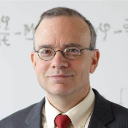特邀报告 
报告题目:Transmon platform for quantum computing challenged by chaotic fluctuations (视频报告)
演讲摘要:From the perspective of many body physics, the transmon qubit architectures currently developed for quantum computing are systems of coupled nonlinear quantum resonators. A certain amount of intentional frequency detuning (`disorder') is crucially required to protect individual qubit states against the destabilizing effects of nonlinear resonator coupling. We have investigated the stability of this variant of a many-body localized phase for system parameters relevant to current quantum processors developed by the IBM, Delft, and Google, considering cases of both natural or engineered disorder. Applying various diagnostics of localization theory --- including a new one, the Walsh transform of the many-body spectrum --- we find that some of these computing platforms are dangerously close to a phase of uncontrollable chaotic fluctuations.
讲者简介:David DiVincenzo is a member of the US National Academy of Sciences. His primary appointment is as Director, Theoretical Nanoelectronics, Forschungszentrum Jülich (Germany). He has a secondary appointment as professor at the EEMCS Department at the TU Delft and a staff member at QuTech since 2017. David received his doctorate at the University of Pennsylvania, Philadelphia, USA in 1983; was a postdoc at Cornell University, Ithaca, USA; then Research Staff Member at IBM Watson Research Center (1985-2011). Having been granted an Alexander von Humboldt Professorship in 2010, David became a professor at the Institute of Theoretical Quantum Information at RWTH Aachen University and director of the Peter Grünberg Institute, where he serves to the present. David is a Fellow of the American Physical Society (1999), and Associate Editor of the Reviews of Modern Physics (2011-present). David DiVincenzo was one of the first physicists to engage in quantum information research and is considered an authority on quantum information processing. In particular, his name is associated with the development of criteria for the quantum computer, known as the DiVincenzo Criteria, and also with the Loss-DiVincenzo approach to solid-state spin-based qubits.
 2024年CCF量子计算大会
2024年CCF量子计算大会



 首页
首页